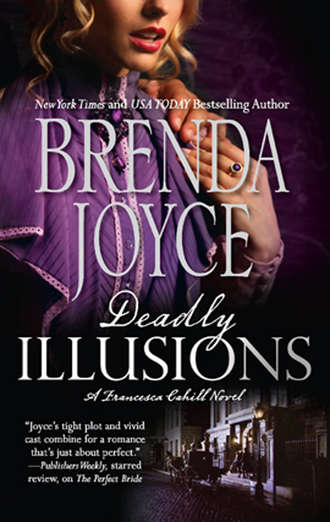
Полная версия
Deadly Illusions

Praise for
BRENDA JOYCE'S
Deadly series
“As Francesca searches for clues and struggles with her complicated feelings for two different men, readers will follow her from turn-of-the-century New York’s immigrant tenements to its wealthiest mansions. Fans of Joyce’s Deadly romances will find the seventh in the series to be another entertaining blend of danger and desire.”
—Booklist on Deadly Illusions
“Just when you think you have it all figured out, Joyce turns it all around, leaving you with a cliff-hanger, and eager for Francesca’s next adventure.”
—RT Book Reviews on Deadly Illusions
“Joyce’s latest ‘deadly’ romance is truly a pleasure to read, given its involving plot, intriguing characters and the magic that occurs as the reader becomes immersed in another time and place.”
—Booklist on Deadly Kisses
“If this is your introduction to Francesca Cahill, you’ll be just as hooked on the series as longtime fans. Joyce skillfully pulls you into her characters’ tangled lives as they pursue a killer.
The ‘Deadlies’ keep you coming back for more because you care about the people and you can sink your teeth into their complicated lives as they twist and turn with mystery.”
—RT Book Reviews on Deadly Kisses
“Joyce excels at creating twists and turns in her characters’ personal lives.”
—Publishers Weekly
“An elegant blend of mystery and romance simmering with sexual tension.”
—Booklist on Deadly Promises
“The steamy revelations…are genuinely intriguing, and just enough of them are left unresolved at the book’s end to leave readers waiting eagerly for the series’ next installment.”
—Publishers Weekly on Deadly Love
BRENDA JOYCE
Deadly Illusions

This one’s for the ladies on the boards:
Thank you for your unwavering support!
Contents
CHAPTER ONE
CHAPTER TWO
CHAPTER THREE
CHAPTER FOUR
CHAPTER FIVE
CHAPTER SIX
CHAPTER SEVEN
CHAPTER EIGHT
CHAPTER NINE
CHAPTER TEN
CHAPTER ELEVEN
CHAPTER TWELVE
CHAPTER THIRTEEN
CHAPTER FOURTEEN
CHAPTER FIFTEEN
CHAPTER SIXTEEN
CHAPTER SEVENTEEN
CHAPTER EIGHTEEN
CHAPTER NINETEEN
CHAPTER TWENTY
CHAPTER TWENTY-ONE
CHAPTER TWENTY-TWO
CHAPTER TWENTY-THREE
CHAPTER TWENTY-FOUR
CHAPTER TWENTY-FIVE
CHAPTER TWENTY-SIX
CHAPTER ONE
New York City Tuesday, April 22, 1902 5:00 p.m.
THE CRIME SCENE was a gruesomeone, indeed.
Chilled, Francesca Cahill stared at the woman. The victim was clad only in her corset, chemise and drawers, lying in a pool of blood the same dark red-brown color as her hair. Shivers swept up and down Francesca’s spine, shivers that had nothing to do with the temperature of the day, as it was warm and sunny outside, a perfect spring day.
Not that one would ever guess that fact from this tenement flat. The railroad apartment that Francesca had so boldly entered was long and narrow, consisting of a single room. A window at each end let in some light, but not much, as the brick building just a few feet behind this one blocked out much of the daylight. At the flat’s far end was the victim’s bed, where she lay in her underclothes. Francesca stood in the doorway, the dark, dank corridor behind her. Between her and the victim were so many signs of a vital if impoverished life—a small sofa, the muddy-hued fabric torn and ripped, a faded and torn throw rug upon which sat a pail of water, as if the victim had been soaking her feet before bed. Beyond the small salon area, there was a rickety square table and two equally despairing chairs, one with a leg tied together. In the kitchen’s area, there was a wood counter covered with some stacked plates and utensils, a wood-burning stove and a sink containing a pot and some other items. In the other direction, behind Francesca, there was a police sawhorse in the doorway of the flat. An officer had placed a Do Not Cross sign upon it.
A man carefully viewed the body. Portly, of medium height, his suit shabby and tweed, Francesca recognized him instantly. She coughed to make her presence known and started forward, her navy blue skirts sweeping around her, tendrils of blond hair escaping her chignon and smart little navy blue hat. In her gloved hands, she clutched a purse.
He whirled. “Miz Cahill!” he cried, clearly surprised to find her there in the apartment.
She smiled warmly, determined not to be ousted from the crime scene although this was not her case, as she had no client requiring her to investigate this murder. “Inspector New man, good day. Although from the look of things, this has not been a good day for the victim.” She cast another glance at the dead woman, who appeared, at this closer range, to be in her early twenties. She had been a pretty woman. Newman had closed her eyes.
He met her halfway. Flushing, a sheen of perspiration on his forehead, he said, “Are you on this case, Miz Cahill? Is the c’mish with you?”
Her heart did a little flip. She hadn’t seen the police commissioner in weeks, not really. Passing him in the hall of Bellevue Hospital the times she had planned to visit his wife did not count. “I’m afraid I am alone. Does this appear to be the work of the Slasher?” she asked, her gaze drawn to the victim as a moth is drawn to candlelight.
Newman blinked. “Her throat was cut, Miz Cahill, like them first two. But this one, well, she’s dead. To my eye, it looks similar to the first two victims. Of course, until the coroner has examined the body, we cannot be sure.”
Francesca nodded gravely, her gaze briefly on Newman. If the newspapers were to be believed—and Francesca knew very well one could not always believe what the dailies reported—there was a pattern here. According to the Tribune, the first two victims had been young, pretty and Irish. The victims, however, had not been murdered, but merely had their throats slashed and were understandably traumatized. But the second slashing was sensational enough to warrant a headline. Of course, this third woman was dead, so maybe there was no connection. But Francesca did not believe that for a moment.
She had learned since embarking on her profession of criminal investigation that she had very accurate instincts. They shrieked at her now. The Slasher was at work here—and the stakes had suddenly changed.
Murder was now the name of the game.
And that most definitely made the case her affair—as people she cared about lived two doors down. “Do we know her name?” she asked softly, noting the way the woman lay. Her arms were flung out, her head turned to the side. There had been a struggle. She felt certain that the dead woman was also Irish.
“Yes. Her name is Margaret Cooper.” He also turned to stare at the victim.
Francesca started at the name, which was no more Irish than her own. She was surprised she had been wrong, but there was still a pattern. She went grimly forward but Newman suddenly detained her. “Miz Cahill? Should you be here? I mean—” and he blushed crimson “—this is a police matter and if the c’mish is not here, I am not quite certain you should be.”
Francesca didn’t hesitate. “I am officially on this case, Inspector, and we both know the commissioner will be supportive of that.” She smiled, at once friendly and firm. But she no longer knew just how supportive of her investigative work Rick Bragg would be. So much had changed—and so quickly.
“Well, I guess I won’t have to decide!” Newman cried in relief as footsteps sounded behind them from the hallway.
Francesca didn’t have to turn to know who it was. She tensed as the police commissioner strode past the sawhorse and into the room.
He was a handsome, charismatic man. Once, she had thought him the most handsome man on the planet, but that had been before she had learned of his estranged wife and his on-again, off-again marriage. Rick Bragg stood a bit over six feet tall, his stride long and purposeful, his shoulders broad, the brown duster he wore for motoring swinging about him. His complexion was dark, his hair golden, and no one looking at him could mistake his air of authority and purpose. In fact, the night they had met at a ball held by her family, in spite of the crowd she had seen him the moment he entered the room. But that felt like a different lifetime, and she had been a different woman, oh yes.
Their gazes met and held.
She realized she had bit her lip and that her fists were balled up. Her pulse had also accelerated. “Hello,” she said, trying not to be nervous. But it was hard. Once, they had been in love. Now she was engaged to his most bitter rival—his half brother, the wealthy and notorious Calder Hart.
If he was surprised to see her, he did not evince it. “Francesca,” he said, pausing before her. His gaze did not move, not even once, from her to the victim or the crime scene. “This is a surprise.”
She stared into his amber eyes and instantly saw how tired he was, both emotionally and physically. She ached for him. She knew he had agonized over the condition of his wife. And suddenly she did not want to talk about Margaret Cooper—she wanted to talk about him, his wife and the two children fostering with them. She wanted to take his hand, she wanted to help.
Instead, briskly, she said, “I ran into Isaacson from the Tribune.” She tried to smile but it felt like a grimace and he simply stared, saying nothing. Her anxiety increased and she clutched her purse with both hands. “He must have been at headquarters when the call came in. When he told me that it might be the Slasher, and that the victim lived on Tenth Street and Avenue A, I had to come directly over. Maggie and her children live two doors away, Bragg,” she said earnestly.
“I know,” he said. His expression softened. “I was concerned myself.” He hesitated, studying her with some intensity, his gaze dipping to the way she held her purse.
She smiled a little at him. He did not smile back. It was simply awkward now, being with him. What should she say, what should she do? Were they still friends? Did he hate her? Had he forgiven her for becoming engaged to the man he bitterly despised? Had he accepted the fact that one day she would marry Hart? For she had finally, with great difficulty, accepted the fact that Bragg belonged with his wife.
Francesca wanted to reach out to him and demand answers to all those questions, but she did not dare. How selfish it would be. But God, there was no one she admired more, no one more noble, more determined, more honorable than Rick Bragg. He had been appointed police commissioner with the charge of re forming the city’s infamously corrupt police department, but it was like spitting into the wind. He had fired some officers, hired new ones, reassigned entire units, but every small step forward was gained at a painful cost. The press hounded his every move. The clergy and the reform movement demanded he do more; politics demanded he do far less. Tammany Hall had lost the last election, but still ruled most of the city. He was up against Platt’s political organization, and the mayor, elected on a re form platform, did not always back him up, afraid of losing the working man’s vote. An election loomed, one Mayor Low did not want to lose. Bragg fought it all, alone.
She knew he would never give up.
And all this with his wife lying in the hospital, the victim of a tragic carriage accident. “I heard that Leigh Anne will be going home soon,” she suddenly said, reaching for his hand without thinking about it. He started as her fingers closed over his, and realizing what she had done, she quickly released him.
“Yes. In fact, they will release her tomorrow.” He looked away.
Francesca knew him so well—or once she had. Now she could not tell whether it was grief or guilt that made him flinch and turn away. “Thank God she regained consciousness within days,” Francesca whispered, a small hurt inside her heart. Why couldn’t she simply hug him and hold him close? He needed to be comforted, that much she knew. She might be engaged to another man, but she would always love Rick, too.
He was grim and he did not speak.
“Is the prognosis the same?” she asked. She had gone to the hospital several times, but in the end had only visited with the rest of the Braggs, who had been coming and going to see Leigh Anne, and not with Leigh Anne herself. She had been afraid of her reception; she had not wanted to upset the other woman, either.
“She will never walk again.” His tone was flat, final. He glanced past her at the victim. “If this is the work of the so-called ‘Slasher,’ then we have a serial killer on the loose.” He walked over to the bed.
Francesca followed until they both stood within feet of the victim. “But the first two victims survived, if the reports I have read were correct.”
He grimly surveyed the body in the bed. The sheets were a cheap coarse cotton, and except for the bloodstains, freshly laundered. The woman’s hair was undone and some of it lay across her neck. “They did survive. Both attacks were one week apart, exactly, each on subsequent Mondays.”
“Oh dear,” Francesca said, intrigued in spite of the terrible tragedy she was witness to. The reporters had failed to note that. “Was this woman killed yesterday?”
“She was found at noon today. But I am going to hazard a guess that she was killed last night, Francesca.” He gave her a significant look.
If the woman had been in her underclothes, then she had been murdered either first thing in the morning, or in the evening before bed. “Rick, I had read that the first two victims were Irishwomen in their twenties. Is that true?”
He leaned over the woman and moved her long, tangled dark red hair away from her neck. Her throat was brutally slit. Francesca wanted to gag; instead, she closed her eyes and breathed hard. No matter how many cases she had, she was certain she would never grow accustomed to violence and death. Of course, there had only been six investigations thus far. Her career as a sleuth had begun last January when her neighbor’s son had been abducted. She had tried to help, never imagining how it would change her life.
Bragg straightened. “Both victims were Irishwomen in their twenties, yes. Both were estranged from their spouses. From the look of this cut, I would say the Slasher has been at work again, but this time with deadly results.”
Francesca stared, forgetting all about her fiancé. She fought her queasiness. “This woman is not Irish. The name Cooper is as American as apple pie.”
“A pattern remains. Three attractive young women, each without means, assaulted on subsequent Mondays.”
Francesca agreed. “Do you think she was killed accidentally? Or is murder now the Slasher’s intent?”
“I have no idea. But if she was murdered Monday, and if the Slasher holds true to the course he has set, there will be another victim in six days exactly.” He faced her and their gazes met.
“We will find this killer, Bragg. And I do mean it.”
He started and, finally, began to smile at her. “If anyone can find him, you can.”
She was thrilled at the gesture of intimacy and she smiled back. “I also assume the Slasher is a man, but we cannot rule out a woman. Remember, the Cross Killer turned out to be Lizzie O’Brien,” she said, referring to a previous case.
“Of course I remember,” he said, and then his expression changed and she thought he was remembering everything that had once been between them. He cleared his throat. “The two previous victims were Kate Sullivan and Francis O’Leary. Neither woman saw the Slasher, as he assaulted them from behind. But it was a man.”
She nodded. “Who alerted the police?”
“A Mrs. O’Neil found her. Apparently, she has the flat next door.”
Francesca stiffened. “Bragg! Not Gwen O’Neil?” An image of the striking redhead assailed her mind.
His tawny eyebrows lifted. “Yes, that is her name. And she is at headquarters. She is very upset,” he added. “Do you know her?”
She seized his arm. “Not only do I know her, you know her, too!”
AFTER SPENDING AN HOUR or more with Bragg at the crime scene, Francesca went two buildings down to visit the seamstress who had become her dear friend, Maggie Kennedy. As she went up the narrow staircase to the flat Maggie let, she was thoughtful. A killer was on the loose, unless the last victim had been accidentally murdered. All three victims had several characteristics in common: they were young, pretty, working class and they all resided within two square blocks. The first two victims, Francis O’Leary and Kate Sullivan, also lived alone. Apparently Francis O’Leary’s husband had vanished two years or so ago, while Kate Sullivan had left her spouse. Margaret Cooper had not worn a wedding band and there had been no sign of a male occupant in her flat—apparently, she had been single, too, although that they would have to confirm. All the victims had been assaulted on a Monday, each a week apart. There was almost no doubt that there would be another assault next Mon day and the likelihood was high that it would be somewhere in the ward and that the victim would be pretty, young, working class, single and female.
Fortunately, the first two victims were alive, which meant she could interview them, perhaps even that afternoon. Although the police had spoken with them, she had not a doubt they had missed crucial clues. Bragg had not been personally involved in the case at that time. Then she remembered her mother’s dinner party and sighed. She would have to attend or there would be a vast price to pay—Julia Van Wyck Cahill was not to be crossed lightly. The interviews would have to wait, as it was well past six already. And then there was Gwen O’Neil. Francesca intended to interview her, too. She wasn’t thrilled that Gwen and her daughter, Bridget, lived right next door to the last victim, just as she wished Maggie did not reside so close by with her children, either. However, the neighborhood was filled with impoverished young women.
As she paused before Maggie’s flat, she thought about the distance now separating her and Bragg. Perhaps she had been a fool to think that he could reconcile with his wife and she could marry another man and somehow they would remain friends. She could not help but be saddened. On the other hand, it was clear to her that he loved his wife, and she was certainly infatuated with Hart. In fact, he had gone to Chicago on business almost two weeks ago and it had been very hard not to think about him constantly.
At least Leigh Anne would be leaving the hospital and going home tomorrow. She wondered if she dared to call on her at home. Then she heard childish shrieks and laughter. Francesca began to smile as she knocked upon the door. Maggie was a widow and was raising four children by herself.
Eleven-year-old Joel Kennedy, once a pickpocket and now Francesca’s invaluable sidekick, promptly answered her knock. He had pitch-black hair and fair skin and his sleeves were rolled up to his elbows. He knew the city like the back of his hand and had helped her out of danger too many times to count. His face was flushed and he looked extremely annoyed. When he saw Francesca, though, he brightened. “Miz Cahill!”
She glanced past him into the one-bedroom flat, which was usually tidy. Now, goose feathers floated about the family room. Joel’s two young brothers, Matt and Paddy, had clearly been in a pillow fight. The boys were on the floor, holding the mostly empty pillows, howling with laughter. They had clearly eaten, as she saw plates with bread crumbs on the kitchen table. Joel followed her gaze and scowled. “Idi’ts,” he said. “Mum will be fierce unhappy when she sees them down feathers all wasted like that.”
“I see there has been no homework today?” Francesca asked. She knew that Maggie had Matt in school, unlike many other working-class families. Too many of the city’s impoverished classes needed the extra income their children could generate. There was also a question of extreme overcrowding and under-funding for the city’s public schools. It was a shame.
Joel, who could read and no longer attended school, shrugged. “He got some letters to do. But he don’t want to do homework now. I didn’t want to fight about it. Got better things to do.”
Francesca closed the door behind her as Joel’s little three-year-old sister came stumbling out of the bedroom, clearly having been napping. “Joel, if they have eaten, Matt should sit down and do his letters. You know how to read—don’t you want your brother to have the same skills and advantages as you? Hello, Lizzie!” She tousled the sleepy child’s silky black hair.
Joel scowled at her. “Are you here on business, Miz Cahill? It’s been awful quiet for way too long.”
Francesca set her purse down on the sofa. “Yes, I am. And I agree with you—it has been a quiet spell for us. Shouldn’t your mother be home at any moment?”
“She should be home real soon. So what case are we on?” he asked with an impish grin. His dark eyes sparkled.
She patted his shoulder. “We are of a similar nature, you and I,” she said fondly. Then, her smile fading, she said, “A woman was murdered two doors down, Joel. She was Gwen O’Neil’s neighbor.”
He paled. “Miz O’Neil an’ Bridget?”
“They’re fine,” she assured him. “Can you start asking questions in the neighborhood? Did anyone notice a suspicious sort lurking about Margaret Cooper or her apartment or building? Was she afraid? Did she know she was in danger? Who were her friends? Did she have any visitors recently? We suspect the killer to be a man. And it might be the Slasher,” she added.
His eyes were wide and he nodded eagerly. “I can get started the minute Mum comes home,” he said.
“Get started on what?” Maggie Kennedy asked, letting herself into the flat. A paper sack filled with groceries was in her arms. “Francesca!” She smiled brightly. “How nice to see you!”
“We got another case,” Joel told his mother in a rush as she gave him a hug. “Been a murder, right on this block!” Maggie paled.
“Joel, please, let me explain,” Francesca said.
Maggie moved to hug the rest of her children in turn, but Francesca could see her distress. “What is this mess?” she asked the two younger boys. “You know I can’t afford more down! Now start picking up the feathers, every single one. Shame on you both,” she added, a tremor in her tone.
Francesca knew that Joel had worried her. She laid her palm on Maggie’s back as the other woman straightened and smiled reassuringly at her. “Shall we sit?”
“Of course, where are my manners!” Maggie cried, flushing. She rushed to the small dining table not far from the stove and sink and pulled out one chair. “Let me boil some water for tea.”
Francesca went to her and took her arm. “Please, Maggie, do not stand on ceremony. I really wish to discuss the case with you.” She gave her a significant look.
Maggie met her gaze and slowly nodded. As they sat down, Joel slammed out of the apartment. Maggie started, clearly un- happy. “It’s a miracle, really, for you to be giving him a salary, but…I worry so!”
Francesca had quickly realized just how invaluable Joel was, so she had offered him employment as her assistant. He, of course, had been thrilled. “You know I would never knowingly put him in the path of danger,” Francesca said, meaning it.
“I know. You have saved my life—and you have really saved Joel’s life, by taking him away from a world of thievery.” Briefly, she cupped her face in her hands, her eyes closed. Then she sighed. “I am glad that Joel works for you, truly I am…”











